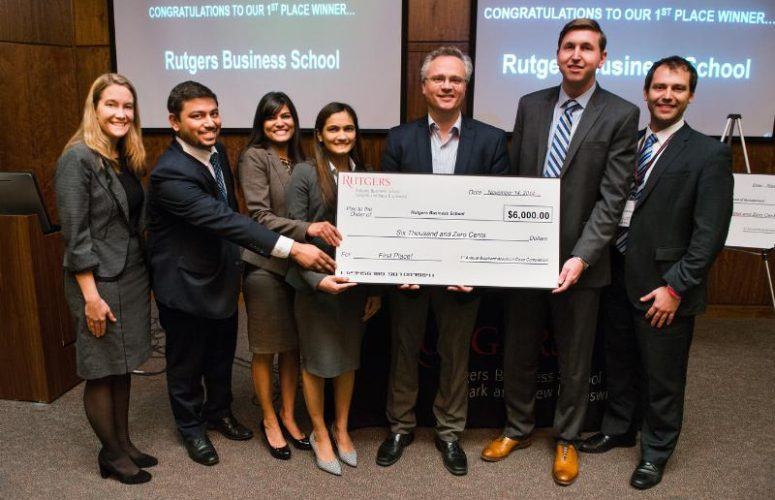
Rutgers MBA Students Come Out on Top in Annual Biopharmaceutical Case Competition
On Nov 26, 2014Rutgers University MBA students Mittal Shah and Sonal Patel were sitting next to one another in Rutgers Business School’s Bove Auditorium as the winners of the annual biopharmaceutical case competition were announced.
Within a few minutes, they knew that Kellogg had won third place. And then, Wharton was announced as the second-place winner.
The women looked at one another, nervously wondering where the team from Rutgers Business School would place. “It’s going to be all or nothing,” Patel said softly, waiting for the next winner to be announced.
When Rutgers was declared the first place winner, Shah and Patel leaped out of their chairs and hugged one another. The room erupted with applause for the home team, which also included Michael Kwatkoski, Paul Rosiak and Kinushuk Saxena, the team’s sole first-year MBA student. All five students are pursuing MBAs in Rutgers Business School’s top-ranked Pharmaceutical Management program.
The third annual biopharmaceutical case competition at Rutgers attracted teams from the nation’s leading business schools, including Wharton, Columbia and Kellogg. Teams also represented Michigan State University, MIT Sloan, Duke, Penn State’s Smeal College of Business and the University of Georgia’s Terry College of Business.
After just a few years, Rutgers Business School’s case competition has become known as an important one for MBA students hoping to move into careers in the healthcare and pharmaceutical fields. The competition has multiple company sponsors, intensifying the networking aspect of the day and the potential for students to impress major companies.
This year’s competition featured a pricing case for an important new class of cholesterol-lowering medicines known as PCSK9 inhibitors. The student teams were assigned to a fictitious company and were required to develop a strategy for launching its drug onto the market.
The Rutgers team started out doing research and brainstorming online and then they locked themselves in a room on the business school’s first floor for four days straight hashing out the details and rehearsing their rationale – the thing that would be challenged by questioning from the judges.
“We prepared a lot,” Kwatkoski said.
In order to maximize their time – the teams only had a week to prepare their cases – Saxena said the team began discussing the case using Google Chat and Google Hangout. The last four days they met and focused on making sure their presentation was solid.
“That was key,” he said. “We were a very committed bunch.”
Patel, who admitted that she and Shah and Rosiak were nervous first-time case competition participants, said everyone benefited from insight Kwatkoski gained from last year’s competition. He told them what questions to expect from the judges, and he prepared them for the judge’s stoic expressions, Patel said.
He told us not to be disarmed by that, she said, to just be confident.
Kwatkoski emphasized that if the team could defend their strategy in the face of questions from the judges, it would help them win. “The crucial piece is realizing that the answer is not the most important but the rationale behind it is,” Kwatkoski said.
The composition of the team also helped – Patel brought experience as a pharmacist and Rosiak’s strength was finance. Kwatkoski is a former hospital bench scientist. Shah offered the team a strong understanding of marketing while Saxena brought insights from six years of work experience inside the pharmaceutical industry, including two years as a regulatory manager at Novartis.
“We definitely played to our strengths,” Rosiak said. “We’ve taken classes together. Some of us have worked on projects together.”
The team, which was making a case for a small company, decided that in order to gain access to a crowded cholesterol-fighting market without much of a sales force, it would provide a discount on the company’s new drug.
“We decided it would work as an incentive to payers,” Kwatkoski said. “If we discounted it at launch, we would gain access (and ensuing revenue) and we could always raise the price later.”
“Once we had our story down, we felt very good,” he said.
Professor Mahmud Hassan, director of the Lerner Center for Pharmaceutical Management, said Rutgers is trying to model its case competition after the well-respected one hosted by Kellogg School of Business.
Hassan said next year he hopes to increase the number of teams that participate and to attract international schools to the event. Rutgers has the potential to do that because of the consortium of company sponsors, he said.
“Having more companies makes it more attractive to the teams,” he said. “The students get to network with more companies, and the companies get to see the talent of the students.” This year, the sponsoring companies were Bayer, Bristol-Myers Squibb, Campbell Alliance, Eisai, Herspiegel Consulting, Novartis and Novo Nordisk.
“For both sides, it’s a win,” Hassan said.
In the days after the competition, the Rutgers students were fielding calls of congratulations from professors and alumni of the MBA pharmaceutical management program. They also won $6,000 in prize money.
“We knew we were competing against these big schools,” Shah said. “It felt really good to win. I feel very proud.”
Related Articles:





